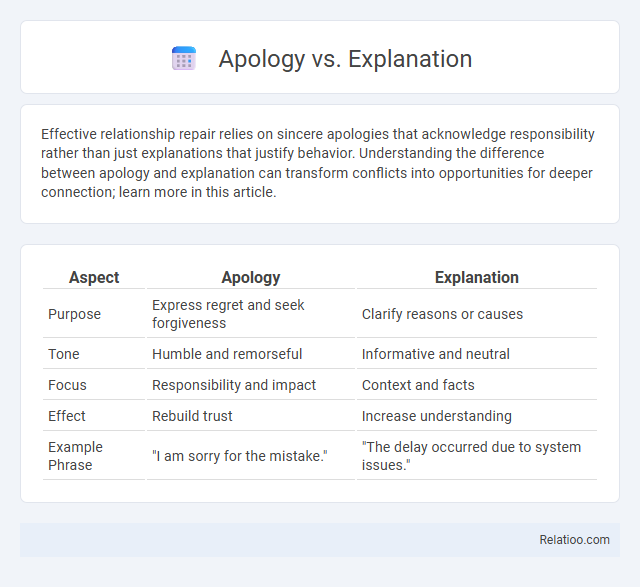Effective relationship repair relies on sincere apologies that acknowledge responsibility rather than just explanations that justify behavior. Understanding the difference between apology and explanation can transform conflicts into opportunities for deeper connection; learn more in this article.
Table of Comparison
| Aspect | Apology | Explanation |
|---|---|---|
| Purpose | Express regret and seek forgiveness | Clarify reasons or causes |
| Tone | Humble and remorseful | Informative and neutral |
| Focus | Responsibility and impact | Context and facts |
| Effect | Rebuild trust | Increase understanding |
| Example Phrase | "I am sorry for the mistake." | "The delay occurred due to system issues." |
Understanding Apology and Explanation
Understanding apology involves recognizing its role in expressing regret and taking responsibility for a mistake, which helps rebuild trust and demonstrates empathy toward those affected. An explanation provides context or reasons behind an action without necessarily admitting fault, aiming to clarify misunderstandings and improve communication. You can effectively manage conflicts by distinguishing between an apology's emotional acknowledgment and an explanation's informational purpose.
Key Differences Between Apology and Explanation
An apology centers on expressing regret and taking responsibility for a mistake, aiming to repair trust and demonstrate empathy. An explanation provides context or reasons behind an action without necessarily admitting fault, focusing on clarifying circumstances rather than emotional reconciliation. The key difference lies in the intent: an apology acknowledges wrongdoing and seeks forgiveness, whereas an explanation aims to inform and justify behavior.
When to Offer an Apology
You should offer an apology when your actions or words have caused harm or offense, acknowledging responsibility and expressing sincere regret. An apology helps to rebuild trust and shows empathy, which is crucial in personal and professional relationships. Unlike explanations or defenses, an apology prioritizes emotional repair over justification or excuse.
When an Explanation is Appropriate
An explanation is appropriate when your actions require context or reasons without admitting fault, helping others understand your perspective clearly. Providing an explanation clarifies misunderstandings and prevents assumptions, preserving trust while avoiding unnecessary conflict. Your choice to explain rather than apologize or defend creates effective communication that values transparency and accountability.
The Psychology Behind Apologizing
Understanding the psychology behind apologizing reveals how an apology differs from an explanation or defense by acknowledging responsibility and fostering empathy. An effective apology addresses emotional needs and repairs trust, while explanations and defenses often focus on justifying actions, which can create distance in relationships. When you offer a genuine apology, you demonstrate accountability that helps heal emotional wounds and strengthen social bonds.
The Role of Explanation in Conflict Resolution
Explanation plays a crucial role in conflict resolution by clarifying misunderstandings and providing context behind actions, which helps to reduce feelings of resentment. Unlike apologies that express regret or defenses that justify behavior, explanations aim to foster mutual understanding and empathy between parties. Effective explanations can de-escalate tensions and pave the way for constructive dialogue and reconciliation.
Common Mistakes: Apology Without Explanation
Apology without explanation often leads to misunderstandings, as it may leave the recipient uncertain about the cause and context of the issue. Your communication should balance sincerity with clarity by providing a concise explanation that supports the apology, ensuring your message is perceived as genuine and well-informed. Avoid vague statements that fail to clarify the problem, which can undermine trust and hinder conflict resolution.
Balancing Apology and Explanation Effectively
Balancing apology and explanation effectively requires acknowledging Your responsibility while providing context to clarify the situation without deflecting blame. A sincere apology demonstrates empathy and accountability, fostering trust, whereas a well-crafted explanation helps the other party understand the circumstances behind the issue. Combining both ensures Your message is transparent and respectful, promoting resolution and maintaining healthy relationships.
Cultural Perspectives on Apology vs Explanation
Cultural perspectives significantly influence the preference for apology or explanation in conflict resolution, with collectivist societies often emphasizing apologies to maintain group harmony, while individualistic cultures may prioritize explanations to assert personal accountability. In East Asian cultures, an apology serves as a social lubricant reinforcing relational bonds, whereas Western cultures might value detailed explanations to demonstrate fairness and transparency. Understanding these cultural distinctions is crucial for effective communication and conflict management in global interactions.
Best Practices for Communicating Regret and Reason
Effective communication of regret and reason involves clearly distinguishing between apology, explanation, and defense to maintain trust and understanding. Your apology should sincerely acknowledge the impact of your actions, while an explanation provides context without shifting blame, and a defense should be used sparingly to avoid appearing dismissive. Best practices include expressing genuine remorse, offering transparent information, and prioritizing the recipient's feelings to foster meaningful resolution.

Infographic: Apology vs Explanation
 relatioo.com
relatioo.com